Grief support book club offers literary discussion and connections
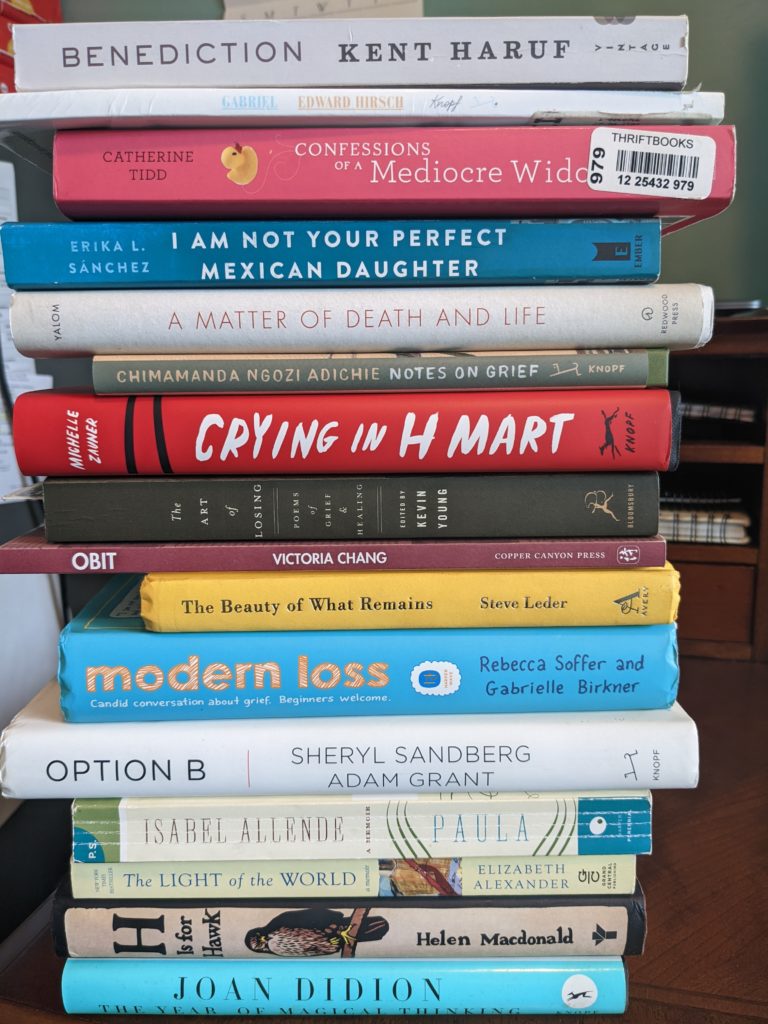 Our Grief Support Book Club meets quarterly via Zoom on the fourth Monday of the month to discuss how stories relate to attendees’ own grief experiences. One long-time participant, Pat Madden, shares what she loves about the group.
Our Grief Support Book Club meets quarterly via Zoom on the fourth Monday of the month to discuss how stories relate to attendees’ own grief experiences. One long-time participant, Pat Madden, shares what she loves about the group.
“Facilitators Melissa White and Kate Nitze provide a space for people to come early in their grief journey as well as those like myself that still need some connection with other grievers years after the loved one has died.
“We are welcome to read part or even none of the book. Flexibility is good for us grievers who don’t need the stress of meeting a timetable. Even if I haven’t read the book, I still gain by listening to the discussion.
“Melissa and Kate make time for people to discuss their grief apart from the discussion of the book.
I recommend this book club to anyone who would like to try it. You will be welcomed by fellow grievers and supportive facilitators.”
For more information and to sign up, contact Kate Nitze by email.
Supporting children through grief
Hospice care offers wraparound support for all family members, regardless of their age. Support for children who are facing the death of a loved one is an important part of our bereavement care.
 “Children are often called the forgotten mourners,” says bereavement counselor Isabel Stenzel. “A child’s life is forever changed by the death of a parent or close family member. We really do acknowledge grief in children and support the grief needs of the entire family.”
“Children are often called the forgotten mourners,” says bereavement counselor Isabel Stenzel. “A child’s life is forever changed by the death of a parent or close family member. We really do acknowledge grief in children and support the grief needs of the entire family.”
Our bereavement team has long provided individual counseling and play therapy for children who are grieving. Thanks to funding from our community, we can now provide extra support for young people who have lost a parent or primary caregiver.
A generous grant from Sandhya’s Touch, a foundation dedicated to improving quality of life for people with chronic or serious illness, funded supplies for several projects, including our new grief kits for children who are grieving a loss.
Isabel explains, “These kits allow us to reach and support so many more young people in ways that can impact their emotional health for years to come.”
“Grieving parents can be overwhelmed and find it difficult to get a child to bereavement counseling – especially in a pandemic world,” she says. “The idea is to offer a variety of age-appropriate resources that young people can explore – with a social worker or spiritual counselor, or on their own.”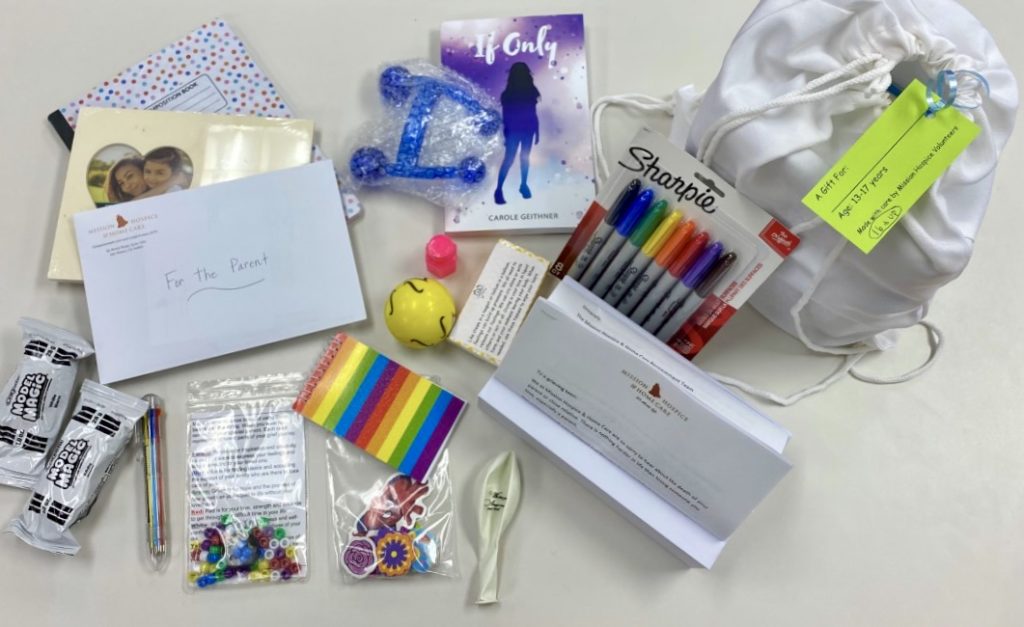
Isabel convened a committee – including volunteer Wendy Parker, a retired school psychologist and counselor – to determine what would be most therapeutic for young grievers. Based on that research, the team developed and created kits with resources specifically designed to support ages 5-8, 9-12, and teens.
Our staff and volunteers have been getting special training on supporting grieving children. Jaymie Byron, LMFT, Director of Community Outreach at our community nonprofit partner Kara, led a special workshop on helping children cope with loss.
Jaymie emphasized that children act differently to grief, crisis, and trauma depending on their age and development. In addition, as they develop, children will re-experience the death in new ways and reintegrate the relationship that has been lost.
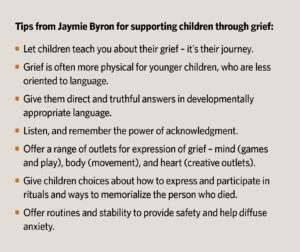 Understanding how children experience grief, and being better able to support them, is a key part of our ability to serve the entire family. As Linda Goldman wrote in her book, Life & Loss, “If a child is old enough to love, he or she is old enough to grieve.”
Understanding how children experience grief, and being better able to support them, is a key part of our ability to serve the entire family. As Linda Goldman wrote in her book, Life & Loss, “If a child is old enough to love, he or she is old enough to grieve.”

Leena’s poem remembers her dad, Raj
 Bereavement counselor Isabel Stenzel has for many years led “Writing Through Loss,” an 8-week workshop for those who wish to express and process their grief with the written word. A recent group participant, Leena, said, “Not only did writing about my own experiences and loss help me make sense of my grief, but also hearing others’ writing was really therapeutic.”
Bereavement counselor Isabel Stenzel has for many years led “Writing Through Loss,” an 8-week workshop for those who wish to express and process their grief with the written word. A recent group participant, Leena, said, “Not only did writing about my own experiences and loss help me make sense of my grief, but also hearing others’ writing was really therapeutic.”
One of Leena’s most moving pieces described her dad’s hands – along with the many memories he helped her create. She agreed to share it. Thank you, Leena.
Fumbling Fingers
My dad says he has fumbling fingers.
I hope you didn’t inherit these clumsy things, he tells me.
No fine motor skills!
He wiggles his fingers ruefully.
Twice as thick as mine
those fingers will never grip a scalpel
or carry out a lifesaving operation
But they are the fingers that patiently traced each line of Make Way for Ducklings and Blueberries for Sal,
guiding my eyes as I learned to make sense of the letters on the page
They are the fingers that showed me how to shuffle playing cards,
How to write in bubble letters,
How to scoop up leftover brownie batter from the bowl.
They are the fingers that gently wiped away my tears
Carefully tucked my hair behind my ears
Deftly tied my shoes
Playfully tickled my toes
The fingers that held on to my bike as I teetered down the road, training wheel-less for the first time
That grabbed the steering wheel as I swerved in the abandoned parking lot on Page Mill, still trying to remember which pedal was gas and which was brake.
These are the fingers I watched leaf methodically through pages of medical documents,
Write down copious notes in doctors’ offices after my mom was diagnosed with cancer
Type frantically into the night researching symptoms, procedures,
mining the internet for a gleam of hope.
The fingers that held my mother’s hands through the bar of the hospital bed.
I watched them clench into a fist
then slowly, painfully, hopelessly, uncoil
Sag heavy at his sides
Then create haphazard rivulets as he ran them through his hair
Finally falling to his face, where they wiped away a stream of tears,
the first I have ever seen him shed.
The fingers that squeeze mine with excitement as I open my college acceptance letter,
The fingers that merrily drum on the steering wheel to the beat of our favorite Billy Joel song,
That painstakingly poke at the letters on his iPhone screen to send me a text,
That sneak a note into my suitcase the night before I leave for college, one that I look at every time I am sad, or happy, or lonely, or hopeful.
Yes, my father had fumbling fingers.
And no fine motor skills.
But it wouldn’t be so bad to inherit them.
— Leena
Grief in the time of COVID-19
by Bereavement Coordinator Isabel Stenzel, LCSW, MPH
During these unprecedented times brought on by the COVID-19 pandemic, the Mission Hospice community is sheltering in place along with people across the globe. For those who have lost a loved one, physical isolation can intensify the grief experience. When we feel fear and anxiety, such as during this pandemic, we naturally yearn for security by wanting our loved ones close to us. Missing your loved one can heighten feelings of self-doubt and even lower self-confidence. You may wish they were here to share in this time and wonder what they would do. Yet there can also be a sense of relief that your loved one does not have to cope with this pandemic, including concerns about caregiving and seeking medical care at this time.
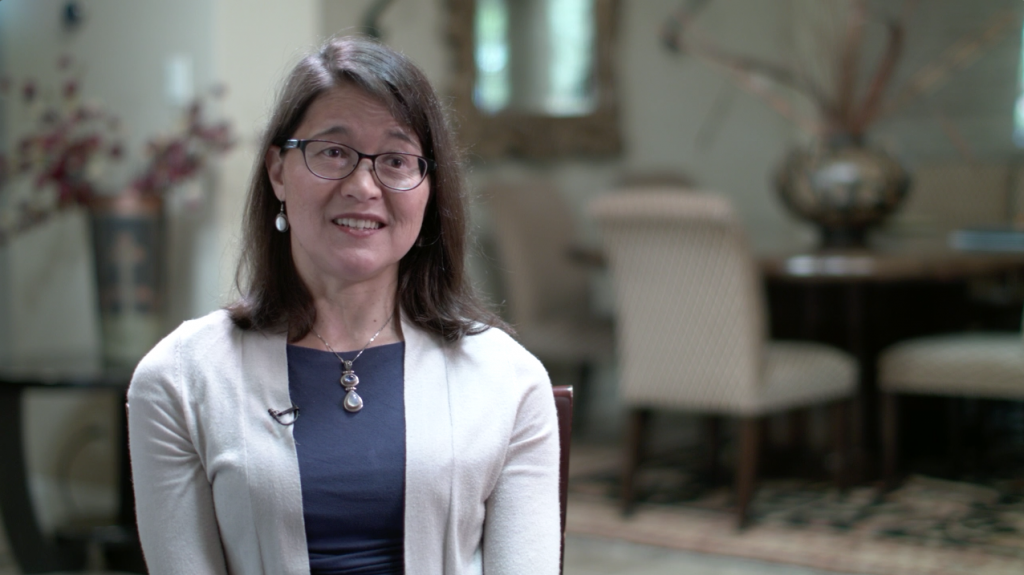 Even if you haven’t lost a close loved one, it is understandable to feel grief at this time. Many have experienced disappointments with cancellations of plans. We miss our friends, grandchildren, and we miss touching and hugging our loved ones. We’ve also experienced the loss of choices, freedom, job security, financial security, and routine, among many things. We’ve lost freedom to engage with groups; it will take time to feel safe again in crowds. We have lost our illusion of full control. Naturally, we might react to these losses with denial, defiance, or irritability, judgment, and frustration towards others.
Even if you haven’t lost a close loved one, it is understandable to feel grief at this time. Many have experienced disappointments with cancellations of plans. We miss our friends, grandchildren, and we miss touching and hugging our loved ones. We’ve also experienced the loss of choices, freedom, job security, financial security, and routine, among many things. We’ve lost freedom to engage with groups; it will take time to feel safe again in crowds. We have lost our illusion of full control. Naturally, we might react to these losses with denial, defiance, or irritability, judgment, and frustration towards others.
Grief is more complex now, especially for those with underlying depression or anxiety. Having traditional funerals and taking care of practical affairs are not possible. Of course, losing a loved one to COVID-19 and not being able to be with them physically at the end of life is devastating. There is collective grief with the enormity of loss around the world to this virus, especially among the less privileged.
Most importantly, this pandemic forces us to look at our vulnerability and contemplate the possibility that we, too, can catch this virus, and could die. This fear motivates us to stay home. At Mission Hospice, we know that death is a natural part of life. Yet modern health care has altered our relationship with death. Death feels more controllable, distant, something that happens at advanced ages or to the unlucky. Yet we are all vulnerable.
This epidemic is a chance to ponder not only our own mortality, but our lives. Have we lived well? What is our legacy? What is left unfinished, and how will I live my life going forward to fulfill my values and goals? Consciously and deliberately practicing personal death awareness can make death less scary, and help us face death with curiosity, wonder, and surrender, rather than fear and avoidance.
For anyone bereaved, grief may feel like it is “on hold” until sheltering is lifted. And many of the choices we have that serve to distract us from grief and help us feel alive are difficult: going out to movies, hanging out with friends, shopping, and traveling. Having something to look forward to can help in grief; right now, we are all in a holding pattern, waiting with uncertainty when this will be over. This all asks us to be patient.
In grief it can be helpful to take turns focusing on grief and then setting it aside. Even at home, we can find ways to honor our loved ones by creating an altar, lighting a memory candle each day, journaling, and reviewing photos. Talking to our loved ones in our heads is natural and can offer comfort. What would he say? What would she want for you? Being stuck at home and feeling bored forces us to feel… feel the grief, acknowledge it, allow it. We cannot run away from it.
Some people stuck at home are cleaning closets and experiencing an upsurge of grief with so many reminders. Yet we can also focus on chores, cooking, reading, enjoying music, watching shows and working on projects. We must be mindful of the tendency towards negative thoughts and balance them with positive thoughts — by consciously choosing to focus on sources of hope, blessings, and gratitude in our lives despite our grief.
Loneliness is a typical emotion in grief, and it can be heightened during sheltering in place. One way to look at grief is that grief is a form of love. The pain of loss is in direct proportion to the love we have felt for the person. The love we feel for our special person who died never dies, but it changes. Likewise, so many things we love have changed because of COVID-19. Our love of hugs and close-togetherness has been altered. Thankfully, we can still socialize remotely — by phone and the internet.
Sharing grief can reduce its intensity, yet we have to find creative ways to connect to others. We can meditate on how many ways we are still interconnected with others: the food we eat was picked by farmers, packaged by workers, delivered by truck drivers, and sold by store clerks. The medication we take was prepared by a chain of helpers, and the news we hear comes from a long list of researchers and journalists. Even if it feels like it, we are never truly alone! And, Mission Hospice staff are still available to answer questions and provide support. Our grief support offerings include online support groups as well as individual grief counseling by phone and video.
Grief is one of life’s hardest experiences. Ultimately, love is the strongest antidote to grief. Allowing love, enduring love, honoring love, and passing it on is what heals grief. When the energy of grief permits, reaching out and helping others less fortunate can keep us connected. We see this inspiring generosity all around us during this pandemic.
As Penny Nixon noticed, “Love spreads more quickly than any virus ever could.”
Bereavement team helps people through all kinds of grief
by Christine Kovach, LCSW, Bereavement Services Manager
April 2024
I have worked in grief support for many years, and I can say with certainty that the grieving process is different for each person and each loss. The one constant is that grief always takes time. Our grief support team helps families and loved ones through this process for many months in a variety of ways so that everyone can find the kind of help they need.
Grief is impacted by so many different factors. Some people – for example, those whose loved one is in hospice care – may have had time to prepare themselves for a death. Others experience a sudden, surprising loss. Grief can be especially intense for people with a limited support system, who have had multiple losses or other big stressors, or who have experienced a recent traumatic death.
At Mission Hospice, we are committed to going above and beyond what Medicare requires for grief support – and to support the entire range of grief. We offer short-term individualized grief counseling for the loved ones of our patients, as well as a wide range of grief support groups, workshops, and other special offerings open to the community.
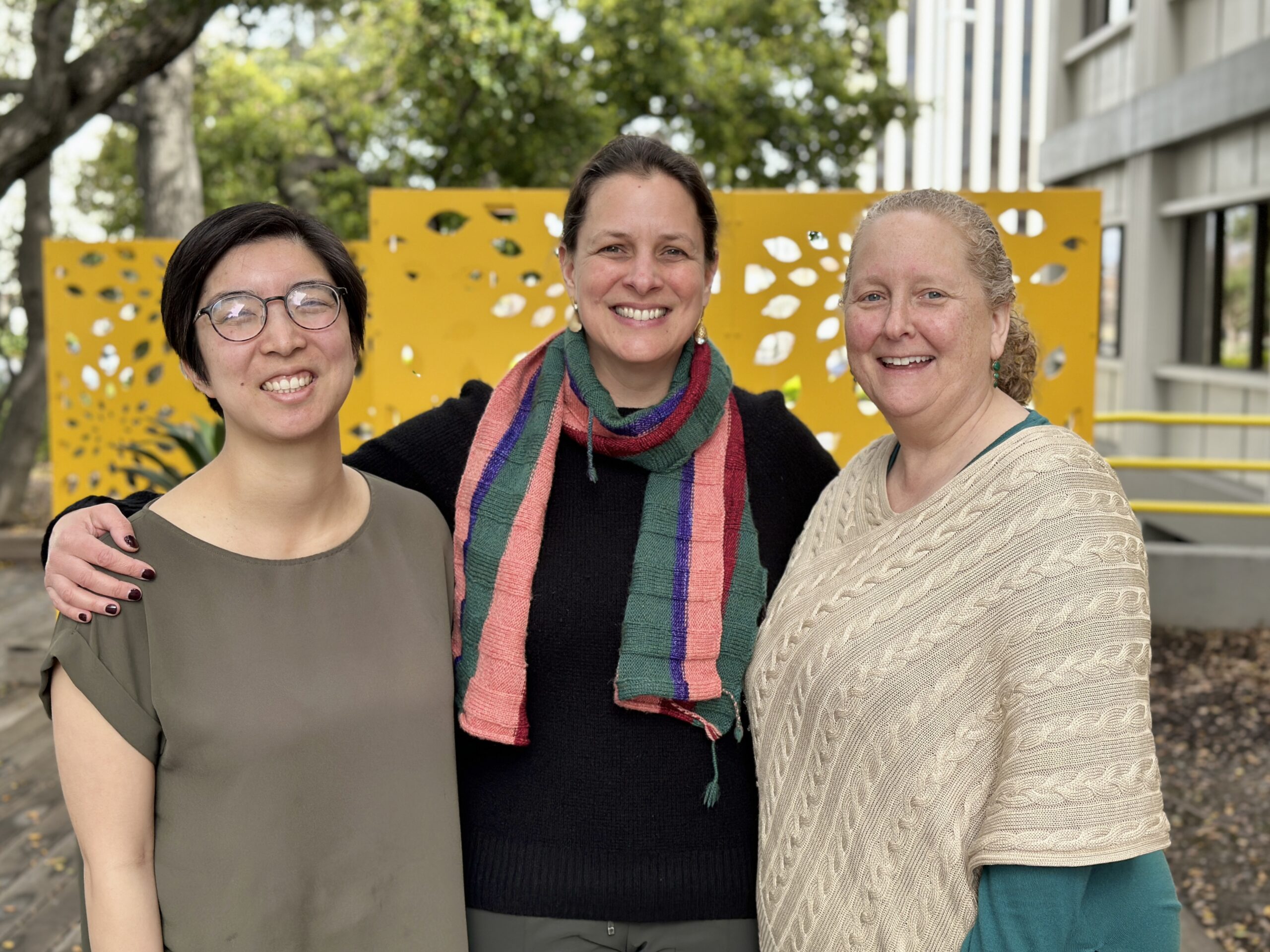 We do this all with our small but mighty team of three staff (I am joined by Bereavement Coordinators Delaney Woo, LCSW, and Kate Nitze, MSW) and a cadre of dedicated volunteers, including counseling associates and student interns, retired therapists, social workers, and nurses, and other trained bereavement volunteers. I am inspired daily by their commitment and creativity. Working with this team is magic – I’m in the wonderful position of saying “YES, let’s do it.”
We do this all with our small but mighty team of three staff (I am joined by Bereavement Coordinators Delaney Woo, LCSW, and Kate Nitze, MSW) and a cadre of dedicated volunteers, including counseling associates and student interns, retired therapists, social workers, and nurses, and other trained bereavement volunteers. I am inspired daily by their commitment and creativity. Working with this team is magic – I’m in the wonderful position of saying “YES, let’s do it.”
It is our goal to care for people throughout our community, regardless of how or why they need grief support after the death of a loved one. This also means offering different modalities of support – whether it is in-person or online, and whether based on group discussion, individual counseling, physical movement, or creative and expressive arts.
Our bereavement program is expansive, ambitious, and inclusive. Not everybody wants grief counseling. Not everybody wants to be in a traditional support group. Some people benefit from a creative arts or writing process. Others are soothed by somatic care. We’re always thinking about new ways to help people heal.
Recent and upcoming programs – many supported by grants from Sandhya’s Touch – include workshops on Drumming for Grief, Art for Healing, SoulCollage®, Writing Through Loss, and sound healing, which uses vibrations from gongs and singing bowls to help participants regulate their breathing. The imagery and metaphor in these workshops can help people to allow for embodied engagement with grief and to work with grief expression in a symbolic way. None of these workshops require any experience – just a willingness to explore with a creative process.


 Community funding and partnerships allow us to reach people in new ways. For example, the San Bruno Community Foundation sponsors an in-person grief support group at the San Bruno Senior Center. We have a partnership with the senior center Avenidas in Palo Alto to create a public ofrenda (altar) and some unique programs for Día de los Muertos (Day of the Dead). In December, we partner with Compassionate Friends to cohost the Worldwide Candle Lighting, bringing light into the darkness of grief. For several years, our Spiritual Counselor Rachel Rosenberg has led a memorial service at the Pacifica Senior Center. And of course, Mission Hospice holds our annual public memorial service, Season of Remembrance, in May.
Community funding and partnerships allow us to reach people in new ways. For example, the San Bruno Community Foundation sponsors an in-person grief support group at the San Bruno Senior Center. We have a partnership with the senior center Avenidas in Palo Alto to create a public ofrenda (altar) and some unique programs for Día de los Muertos (Day of the Dead). In December, we partner with Compassionate Friends to cohost the Worldwide Candle Lighting, bringing light into the darkness of grief. For several years, our Spiritual Counselor Rachel Rosenberg has led a memorial service at the Pacifica Senior Center. And of course, Mission Hospice holds our annual public memorial service, Season of Remembrance, in May.
There is a lot to grieve in the world right now, and these programs let us bring people together to acknowledge our own personal grief and provide an outlet for the collective grief we’re all holding.
Grief often doesn’t go away completely, but rather changes in intensity over time – and everyone needs different support at different times. Some people are ready to talk about it right after their loss; others are ready at the anniversary of the death. Sometimes a death throws people into financial challenges or into the work of managing an estate, and they can’t begin to think about their broken hearts right away.
What I love about Mission Hospice is that our whole team is committed to offering a range of support so that no matter what your circumstances or experience, when you are ready – we are here for you.
Our events calendar lists upcoming support groups and workshops. You can find videos of past programs on our YouTube channel.
Experiencing Grief: My Story of Loss and Love
This talk was presented at our 2015 “Light Up A Life” remembrance ceremony by Suzannah M. Stason, L.Ac., a licensed acupuncturist who lives in Bernal Heights, San Francisco.
 Good afternoon. As many of you know, today is a day called the Day of the Dead, or All Souls Day, when we gather to remember and honor the ones we have lost. Today, I want to honor Suzanne, my dear beloved partner who died last year. She was an incredible woman who touched many people with her humor, generosity, and undying commitment to life and service. For me, Suzanne was a saint who came into my life and gave me the most amazing gifts, ones I am still uncovering as I continue forward in my life here without her.
Good afternoon. As many of you know, today is a day called the Day of the Dead, or All Souls Day, when we gather to remember and honor the ones we have lost. Today, I want to honor Suzanne, my dear beloved partner who died last year. She was an incredible woman who touched many people with her humor, generosity, and undying commitment to life and service. For me, Suzanne was a saint who came into my life and gave me the most amazing gifts, ones I am still uncovering as I continue forward in my life here without her.
Suzanne was an immigration defense lawyer turned Chinese medicine doctor turned Zen Buddhist priest. She was 45 years old when she died and lived a short but magnificent life. When I think about Suzanne, I remember her voice, her laugh and the way she looked at me. I remember the way we went through the world together as a team with such ease, kindness and fun. I can hear her hilarious jokes and remarks and I admittedly steal her lines sometimes and continue her humor in the world. I talk to her and ask for help when I’m really scared or unsure what to do. I think WWSD – What Would Suzanne Do – on many occasions and listen to her wisdom and guidance to help me navigate my life. I feel her love in my heart as I move forward.
I invite each of you now to think about your loved one lost and to call him or her in this room here with us. Take a moment with your loved one at your side to remember the love you shared. And take a moment to honor yourself, your story, all that you have been through.
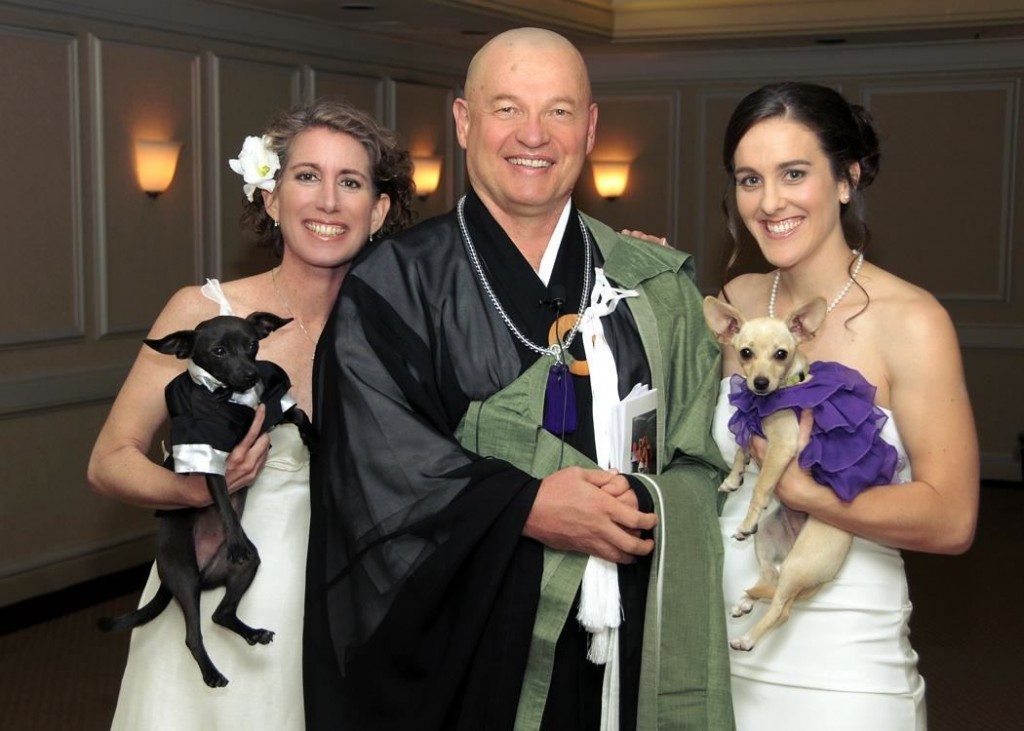 When I think of “Light Up a Life” I think about our loved ones lost and I also think about your life and mine. I think about the light within each of us that can and will get us through this difficult and transformative time. And I think about all that we can do to honor our loved ones by honoring and loving ourselves.
When I think of “Light Up a Life” I think about our loved ones lost and I also think about your life and mine. I think about the light within each of us that can and will get us through this difficult and transformative time. And I think about all that we can do to honor our loved ones by honoring and loving ourselves.
I tend to talk about things that are not easy. At my partner’s funeral last March, I shared the story of her death, the beautiful sunrise that followed and poignancy of her passing. My words from the service are captured here in the back of this book, Zen Cancer Wisdom, which my partner, Suzanne Friedman, wrote during her cancer years.
My partner died last spring after three days of hospice care and four years of lung cancer. It was a most profound and life-altering experience to watch her fade and take her last few faint breaths. Being the one to make call to start hospice and orchestrate the steps that followed while on very little sleep left me weary and worn, but somehow, with the support from the Mission Hospice team, my dear friend Gary, and family and friends, I was able to get through it and help my beloved wife to die a serene and peaceful death.
Today I want to talk about grief. Your grief and mine. Grief is not easy. But for you, for your loved ones, and for me, it’s what is here today. Grief may include many things: shock, guilt, sadness, loneliness, dread, depression, fear, paralysis and perhaps even giddiness or laughter at times. For each of us it is, will be, and must be different. Your grief is your own unique experience, it’s a private journey that is rarely understood by others. But I do believe it’s an important journey to share, as I am doing with you here today.
I ask you to think for moment about what words you would use to describe YOUR grief so far. And for many of you, I know the journey has just begun and still feels quiet new.
For me, the words that most describe my grief experience in the last 20 months following Suzanne’s death are confusion, sadness and transformation.
First came confusion.
For a long time, especially early on, grief felt like being in a vast ocean of turbulent waters in a small rickety boat with no oars. Unable to tell which direction was which with no bearings, no landmarks, and no strength, I felt lost and uneasy. It was like I was floating helplessly with no sails and no course to sail. Confusion arose and stayed for what felt like days, weeks at a time. Nothing felt real. I felt I was doing everything wrong. And as soon as I started to think I had found a way, something to hold onto, the winds would shift or my boat would fill with water once again.
I recall waking up to the marathon of heart it took each day to engage with the world. For me, the mornings were the worst. The mountains of paperwork, the new responsibilities around the house, the silence and loneliness that brought painstaking tears, all with the daunting project of starting my own acupuncture practice in the midst of this loss.
I began to notice I felt in awe of grief. It surprised me at every corner. I never knew what would come next, how I might feel, if this day was going to be an okay day or not.
This brings me to my sadness.
I have never known such sadness before. I have lived a happy and fulfilling life and nothing did or could have prepared me to feel this much. And yet a huge part of my grief journey has been exactly this. To learn how to feel. To learn how to feel this much emotion.
Emotions are like powerful waves that come and go. At first, my little dingy was overwhelmed by them, but in time and with help from grief counseling, friends and meditation practice, I learned how to work with them. I sometimes saw them coming and sometimes was hit directly in the face. Either way, sadness came and I learned it was useless trying to keep it out.
Suzanne, my partner, a wise woman used to say, “Emotions are meant to be felt, not held on to.” Over the past 20 months, my sadness has been my teacher. I have learned to cry, to wail at times, to be silent and to share. I have learned that emotions are energy, and they move and shift and sort themselves out through our human experience. And I have learned to step out of the way just a little to let them run their course and to watch them with a kind and loving mind.
What else have I learned about grief? I have learned that grief is painful. It is heartbreaking and consuming. It is also extremely powerful. It has the energy to move mountains, to shake the very earth, the very ground that we have come to rely upon. For a while, I felt that the foundation of my life was gone, that I had nowhere to stand. My heart was broken. And to this day there is a piece of my heart that is still cracked and will never fully heal, but I have also learned that the story does not end here.
This brings me to my third word: transformation.
Suzanne was the love of my life and me hers. I was able to give her tremendous gifts and she gave me more strength, love and laughter than I could have ever dreamed. She is a part of who I am and how I see the world. And she always will be. I stand here before you to tell you that I am still grieving, still learning, and still growing every day from having lost Suzanne.
I look at my grief as an incredible journey that has beckoned me to open my heart and find strength and resolve at every corner. I am honest in saying that my heart bleeds, aches and hurts all the time, but I can feel it growing stronger too. There are moments, slices in time, when I know transformation is happening. It happens slowly and is almost imperceptible, but I can feel it and I believe it.
I no longer feel so vulnerable in the open waters. I have fixed up my boat and learned to put up my sails. I have gained strength and confidence to move forward with the shifting winds. I have found a course and let both my loss and love be my guides. I have learned to keep going, to be gentle with myself and to follow my heart on this path of grief.
I now have a successful acupuncture practice in San Francisco and finally feel I have a grasp on my life and responsibilities. I have slowly learned to accept and adopt my new identity as a house and pet owner and single woman living in the big city. I am dating and enjoying meeting new people. I have traveled and seen vast new worlds and done service work abroad. I am close with Suzanne’s family, niece and nephew and feel so grateful for them in my life. I miss Suzanne everyday, and I feel her close.
One last thing I will share with you today is my new year’s resolution from last year, 10 months after Suzanne died. It was, “To fall in love with the world again.”
Finding beauty in the world and in others has helped me get through the most difficult times, and this is my wish for you – to find your own unique path through your grief and to move towards beauty, goodness and growth. I know it will be difficult, and I know it can be beautiful.
I thank you each for listening and for bringing your heart and loved ones into the room and to the world. I offer you deep condolences for your loss and offer you my love – my full, open, broken-hearted love. Thank you again, Thank you Isabelle, Thank you Mission Hospice, and Thank you Suzanne.
Eight tips for grieving through the holidays
The holiday season can be a difficult time for those who have recently lost a loved one. While others are celebrating, the bereaved may feel isolated, with intensified pangs of longing for their loved one. These tips may help grievers survive the holiday season.
- Be kind to yourself. Find the balance between what needs to be done and what you are capable of doing. Try not to judge yourself if you have to say no.
- Accept your feelings. Be mindful about feelings of sadness and loneliness; just acknowledging these difficult feelings will often allow them to pass more quickly than if you keep avoiding them.
- Ask for help. Turn to your family and friends when you need support.
- Take care of yourself physically. Eat well and get plenty of sleep. Try to get moderate physical exercise. Try relaxation exercises when you feel tension in your body.
- Change something. So many things have already changed. Be open to changing some traditions.
- Let go of perfectionism. Release your vision of what a perfect holiday needs to be. Open yourself up to spontaneity and unexpected moments.
- Consider a ritual. Consider a new ritual to recognize the absence of a loved one. A candle lighting, a symbolic gift, a tree planting or writing a letter to a loved one can be new family traditions to help you connect to your beloved departed.
- Look for joy in the moment. Joy happens when you look for it. Live in the present.
Renowned grief researcher Ken Doka, PhD, recommends that the most important things grievers can do for themselves during the holidays are the three Cs: choose what works for you; communicate what you need; and compromise with others who want you to engage in holiday traditions.
Mission Hospice offers a Grief and the Holidays support group each year, as well as free weekly drop-in bereavement support groups and other grief support. Details about current support groups are on our calendar of events.
About grief
From Mission Hospice & Home Care
Grief is a normal response to loss. It is painful to lose someone you love, and the pain of loss can be profound. Each of us experiences grief differently. There is no right or wrong way to grieve. Grief can affect all aspects of our lives– psychological, physical, social, and spiritual.
Grief may involve many different emotions – sadness, loneliness, guilt, anger, helplessness, anxiety, fear, confusion, and relief. And while grief, for many, is intensely emotional, there are those who grieve quite deeply in other ways. Some may explore their grief and the issues and questions it raises through reading or writing. Others may grieve more actively by doing things that were important to their loved one or by becoming involved in a meaningful cause. It is important to remind ourselves that there are many ways to grieve; this prevents us from making judgments about how others are grieving, or how we, ourselves, grieve.
Grief may make it difficult to concentrate, remember things, and make decisions. This is a normal part of grief.
Grieving people may feel exhausted much of the time. It takes a great deal of energy to carry intense feelings of grief and learn to live without our loved one. It is common to experience a change in sleep patterns, a loss of appetite, and other physical symptoms. It is important to see a doctor before you assume symptoms are due to grief.
Grief prompts us to question and search for meaning. Our belief in the order and kindness of the world may be shaken. We may question our spiritual beliefs. We may ask, “why?” and ponder the meaning of our own death.
The process of grief offers choices. You can choose to grieve in a way that is right for you. Grief challenges us to find our unique strengths and offers the opportunity for transformation through personal growth and new meaning in our lives. We do not “get over” grief and return to “normal.” Grief changes us forever.
Because grief is a normal response to loss, it is not something that needs to be treated. But support groups and individual grief counseling can be a great source of support for those who are grieving or facing the death of a loved one.
Suggestions for healing
From Mission Hospice & Home Care
Grieving the death of someone close to you can be both physically and emotionally exhausting. Even the smallest tasks of daily living can be overwhelming. It is important to be good to yourself. Put aside what is unnecessary, and instead focus on what nourishes and restores you – and allows you to grieve.
Attend to your physical health and well-being. A healthy diet, plenty of rest, and regular exercise provide a good buffer against the stress of grieving. Do not neglect your routine health care. Consult a doctor if you experience any new symptoms.
It may be tempting to use alcohol or drugs to numb the pain of grief. This only postpones the necessary process of healthy grieving and can have adverse effects on your health.
Give yourself permission to grieve and the time to do it. Open yourself to every feeling that comes along. Give yourself both time alone and time with others whom you trust and who will listen. Be patient with yourself. Do not be discouraged if, at times, you feel that you are taking one step forward and two steps back. Such is the nature of grief. It is true that time does heal.
Give yourself permission to do the things that make you feel good, that comfort you, that give you respite from the pain of grief: a long walk, a good novel, a movie, dinner with a friend. Balance is important. Simple pleasure is good nourishment.
Share your loss with others. Find those who will listen without judgment. Talk about your loss with family and friends who are grieving the same loss. Talk about your loss with someone who is not affected by the loss. The company of others, each with a different perspective, can be valuable.
Trust your instincts and honor your needs. They will, no doubt, vary from day to day – even from moment to moment. You may have plans with someone and, at the last minute, have an overwhelming need to be alone. Allow yourself to cancel. The emotions of grief can be very unpredictable.
Although grieving is a normal response to loss, there are times when people need professional help with their grief. If your grief is seriously impacting other areas of your life (loss of relationships or a job), if you are engaging in self-destructive behaviors or having active suicidal thoughts, if after an extended period of time you continue to have no interest in life, or if others or you yourself feel that you need help – please find help. Seeking help is a sign of strength – not weakness.
If spirituality or religion are part of your life, you are probably well aware of how it can support and comfort you. Simple prayer can be sustaining. Religious and spiritual communities, beliefs, and rituals can all be a great source of strength to those who are grieving. It is not uncommon for loss to raise questions and doubts about one’s faith. If you are experiencing such doubts, find someone to talk about them with.
Remembering and honoring those who have mattered deeply to use remind us that, even though they are no longer physically present, our relationship with them continues. Our memories bring our loved ones into the present and remind us that they can continue to enrich our lives. Honoring our loved ones can help give meaning to a loss. Some ways we can do this are through rituals, artwork, writing, creating an altar or garden, or supporting a good cause.
